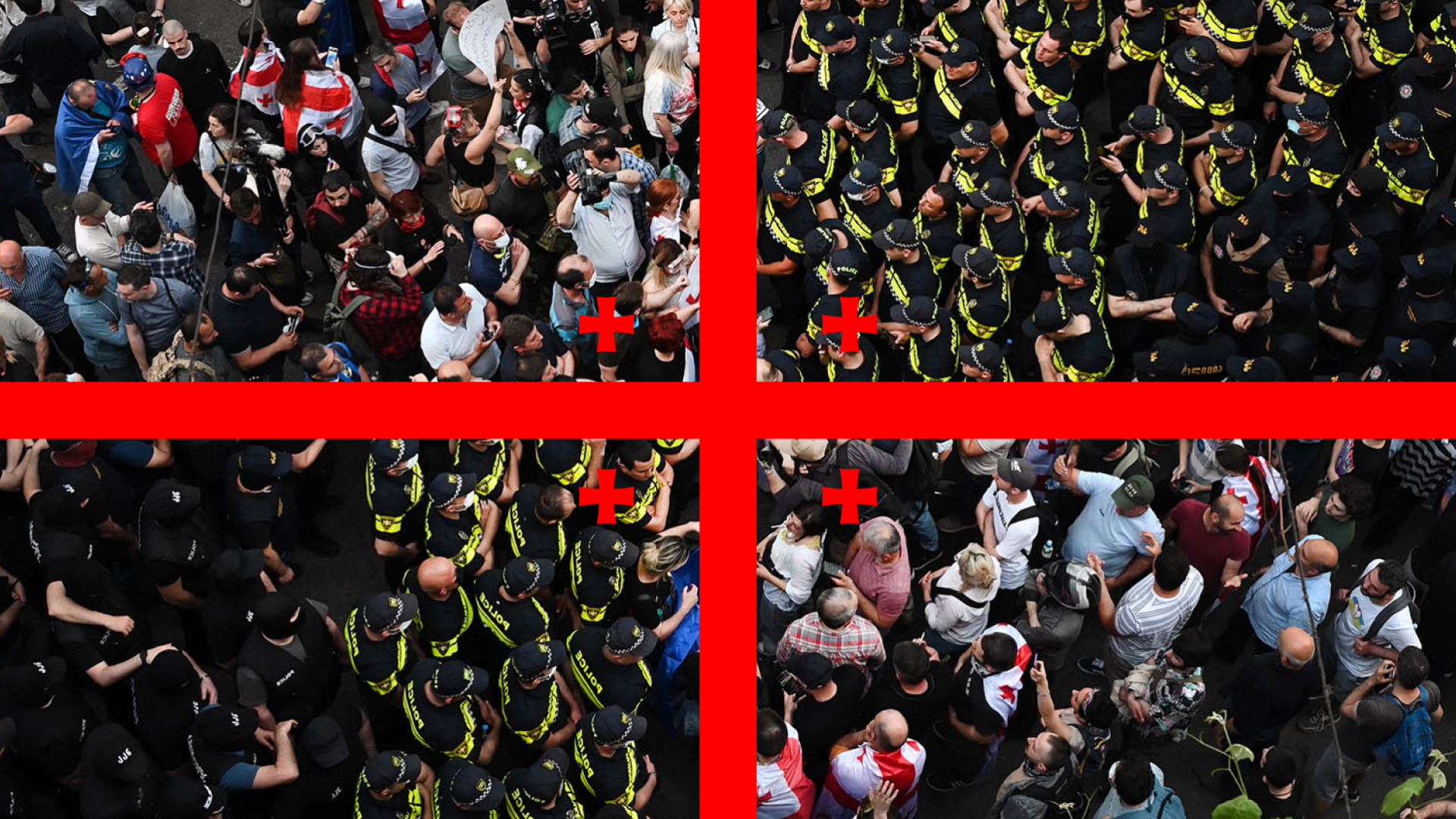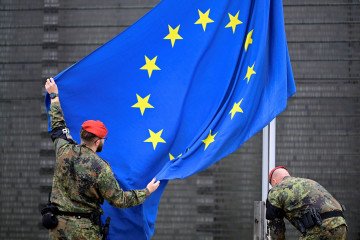- Category
- World
Georgia's Long Struggle for Freedom, From Imperial Annexation to Russia's Modern Meddling

You may have heard about the recent protests that have swept across Georgia. Images of thousands of people on the streets of Tbilisi have flooded news feeds worldwide. But what is the trigger for these protests?
At the center of the recent protests in Georgia is a bill—widely known as the “Russian law”—which requires that NGOs and media outlets that receive over 20% of their funding from abroad register as “foreign agents.” This law echoes Moscow's 2012 autocratic measures, which were aimed at eradicating any pro-democracy opposition in Russia.
From Russia with oppression
For a long time, Georgia was known as one of the leading countries that, after the Soviet Union, decided on a free path for its future—one toward Europe and democracy and away from Russia’s authoritarian control. But today, many believe that the Georgian government is jeopardizing this path.
Seeing the violent crackdown on the peaceful protesters, Josep Borrell, the EU’s foreign policy chief, took to X to condemn the government.
"Georgia is an EU candidate country, I call on its authorities to ensure the right to peaceful assembly. Use of force to suppress it is unacceptable.”
Ursula von der Leyen, the European Commission President, said, “I am following the situation in Georgia with great concern and I condemn the violence in the streets of Tbilisi.”
In a joint statement, Members of the European Parliament deplored the adoption of the "foreign agent law" by the Georgian Parliament. They voiced their great disappointment, stating that the ruling majority "ignored the concerns of human rights watchdogs and international partners, including the EU and the US." The European Parliament urged Georgian authorities to withdraw the law to prevent deeper rifts within the country and to protect its international standing and European future.
Meanwhile, on the ground in Georgia, protesters kept voicing their will despite the pushback.
"The government should hear the free people of Georgia," said one protester, waving a large Georgian flag and leading a procession.
"We want to enter the European Union with our proud nation and our dignity," she said.
Anuki, a 22-year-old student, said it was her generation's responsibility "to make sure that our future and the future of generations after us are safe, that they have freedom of speech, and they are free."
"We don't want to be part of Russia."
For Georgian youth, European integration embodies more than politics—it represents equality, freedom, and human rights. The protests have been a vibrant display of unity, with Georgians from all walks of life voicing their nation's will against encroaching authoritarianism.
“You’re understandably angry today, and rightfully so, but let's focus on the task at hand,” President Zourabichvili addressed the crowd gathered outside parliament after the ruling Georgian Dream party’s vote had overridden her veto of the bill. She pledged to hold a referendum to gauge public sentiment on European integration.
Prime Minister Irakli Kobakhidze, a staunch supporter of the new law, labeled the President’s actions a “betrayal” during his speech on Georgia’s Independence Day on May 26. Kobakhidze stated that his government had “sustained peace within our nation over the past two years, despite facing existential threats,” safeguarding "Georgia's sovereignty and independence.”
While Kobakhidze didn't shy away from attributing Georgia's problems to the "inexperience of our society and the betrayal of politicians," he noticeably omitted to address the elephant in the room—the exact country that has long posed as the primary source of Georgia’s “existential threat.”
After all, the Georgian people had to fight against Russia for centuries.
The early woes of occupation
In 1801, the Russian Empire annexed the kingdoms of Georgia under the pretext of protection from Persia, imposing its own administration and exiling the Georgian monarch. Georgian nobles defied enforced rule, but Russian forces surrounded them within the walls of Tbilisi's Sioni Cathedral—the city’s gem—and forced to swear allegiance to the imperial crown of Russia, a symbol of their subjugation. Those who resisted faced arrest.
Throughout the 19th century, Georgia endured cultural and political suppression under Moscow's rule. Efforts to resist Russian dominance, such as the Rebellion in Guria, were met with brutal repression, killing, wounding, or imprisoning over a hundred people. Russia solidified its control over the country with violence and death.
However, the fall of the Tsarist regime in 1917 presented a chance for freedom. Georgia declared independence in 1918 and formed one of the first liberal, multi-party democracies in Europe, with women co-writing the Georgian constitution and being elected to the parliament.
Yet, the efforts to build a democratic state were short-lived. Russia returned, this time as the Bolshevik Red Army, invading Georgia in 1921.
The Red Terror
“The snow was falling… Tbilisi, clothed in clothes of mourning.
Sioni Cathedral, quiet. The people, standing silent.
Our city froze, half awake, half asleep; once more the anvil was forging horrors,” wrote Georgian poet Kolau Nadiradze, describing Russia’s Red Army moving in on Tbilisi in his poem 25 February 1921.
The world largely neglected the violent takeover, with the West stating support but no help coming along. Moscow staged a full-scale invasion under the guise of "protecting itself." The young democracy was brutally crushed and incorporated into the Soviet Union.
Georgia’s intellectual resistance to the Bolshevik regime and occasional guerrilla warfare evolved into a major rebellion in 1924. Moscow brutally repressed it, executing over 12,000 and exiling over 20,000 people. The Red Army's raids killed thousands of civilians, exterminating entire families, including women and children. Soviet rule reestablished itself through ethnic cleansing of Georgians.
Yet, the spirit of resistance persisted.
The late 1980s witnessed a resurgence of independence movements across the Soviet Union, including Georgia. Massive protests erupted in Tbilisi in 1989, with tens of thousands of Georgians gathering before the House of Government in a peaceful demonstration. Soviet troops violently suppressed the crowd, killing 21 people in what became known as the Tbilisi Massacre. This tragic event galvanized the independence movement.
With the Soviet Empire crumbling, Georgia seized another historic chance. A 1991 referendum overwhelmingly supported independence, and Georgia reclaimed its sovereign status. This period was marked by a strong sense of national renewal, with Georgians seeing themselves as restoring a statehood stolen twice—by the Tsars and the Soviets.
“The Soviet period destroyed everything,” said the Georgian novelist Lasha Bugadze.
“We lost 70 years.”
The 2000s: A decade of turmoil and transition
Following the restoration of independence, Georgia yearned for a European future. This ambition clashed with Russia's desire for regional hegemony. As in centuries past, the empire stoked conflicts, arming separatist movements in South Ossetia and Abkhazia—orchestrating the nation’s divide while feigning neutrality.
The 2003 Rose Revolution roared with Georgian aspirations for liberty and Western ties, igniting a fervor for reforms to uplift societal well-being. Yet, Moscow kept lurking in the shadows, seeking to capitalize on the tumultuous moment.
Russia’s continued support for South Ossetian and Abkhazian separatists created a volatile situation, with periodic skirmishes and fragile ceasefires. Border clashes punctuated the decade, with Russia fabricating narratives of restoring peace and security while preparing for war.
In 2008, Georgia neared a NATO membership action plan, a crucial step towards Western integration. This was Georgia's moment to forge its own destiny. Then came Russia.
On August 1, Russian-backed South Ossetian forces shelled nearby Georgian villages. The Russians illegally crossed into Georgia through the Roki Tunnel, advancing before the Georgian military could respond, justifying the invasion as protecting Russian citizens with its characteristic "peace enforcement" operation. By August 8, Russia had launched a full-scale land, air, and sea invasion of Georgia.
The international calls for a ceasefire ended up benefiting the invader’s interests. Russia’s well-oiled propaganda machine helped spin the narrative that Georgia was the aggressor, despite Russia launching the full-scale invasion. The success of the disinformation campaign ultimately emboldened them—Russia painted itself as the defender of South Ossetia. The world's response was either muddled or muted, with very little support for Georgia. Thus, Russia paved the way for further land grabs that have lasted until today.
In a pincer movement, Russian forces opened a second front, attacking Abkhaz Kodori Gorge, with Russian warships sealing off Georgia's Black Sea access, claiming that its fleet vessels' presence was to provide aid to refugees. Meanwhile, Russian jets pounded targets deep within Georgia. Russia waged a brutal war, combining cyberattacks with on-the-ground aggression to dominate all fronts, including the information war.
Only in 2022 did the International Criminal Court issue arrest warrants for three Russians linked to war crimes against Georgian civilians during this war.
This brief but intense five-day combat left hundreds dead and had lasting geopolitical ramifications. Thousands fled, homes were destroyed, and Georgian soil became a war zone. Moscow tightened its grip, recognizing South Ossetia and Abkhazia as independent states despite international disapproval. Today, Russia effectively occupies 20% of Georgia.
Learning from the past
Fifteen years later, a new generation of Georgians, raised in a free country, is now on the frontlines of this centuries-long fight.
Despite Russian efforts to sway Georgia away from Europe, including with a constant stream of anti-Western propaganda aimed to cultivate Soviet nostalgia and demonize European integration… It failed. Georgian unity in pursuit of a democratic future remains strong and the protesters have been conveying one clear message: subjugation no more.
“I'm from Abkhazia! Never again will my home belong to Russia!” read one sign.
“We don’t follow the flow, we are the flow!” said another.
“I raised four children, not for them to live under Russia! No to ‘Russian law’”
“We will fight until the end!”
The people of Georgia have shown remarkable courage and determination in expressing their will. "Look, Europe! When have you seen someone hold your flag so high?" says one sign, reflecting the sentiment of last year's protests.
It's a plea for the world to recognize their struggle.

-27ef304a0bfb28cb4215e5deede4a665.png)
-46f6afa2f66d31ff3df8ea1a8f5524ec.jpg)

-605be766de04ba3d21b67fb76a76786a.jpg)
-2c683d1619a06f3b17d6ca7dd11ad5a1.jpg)

